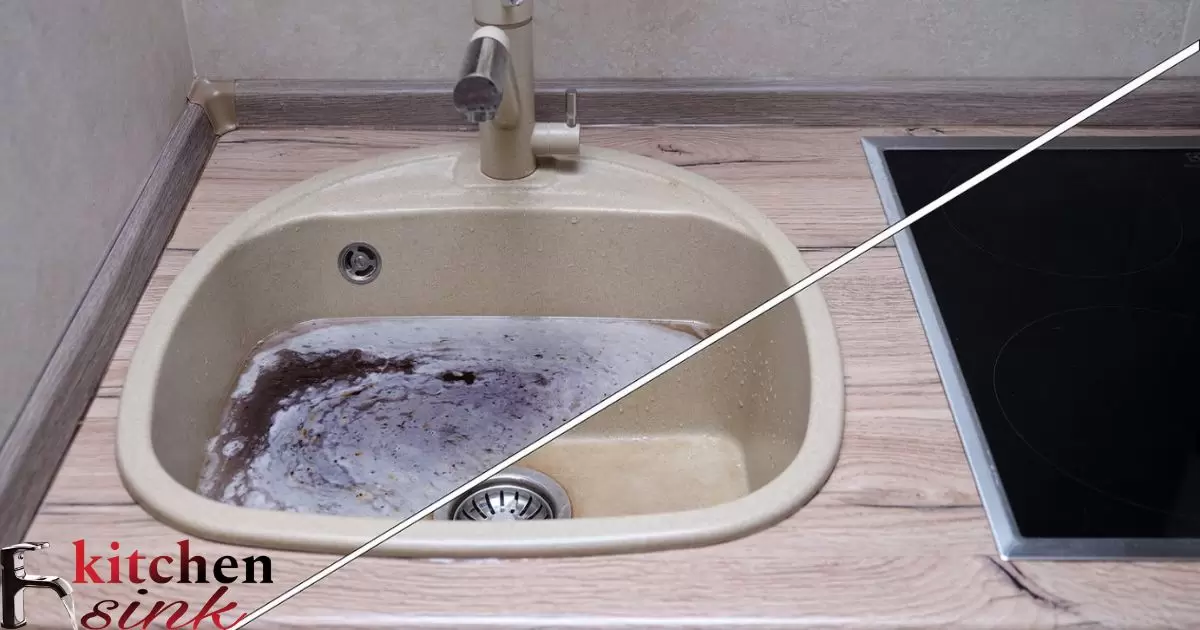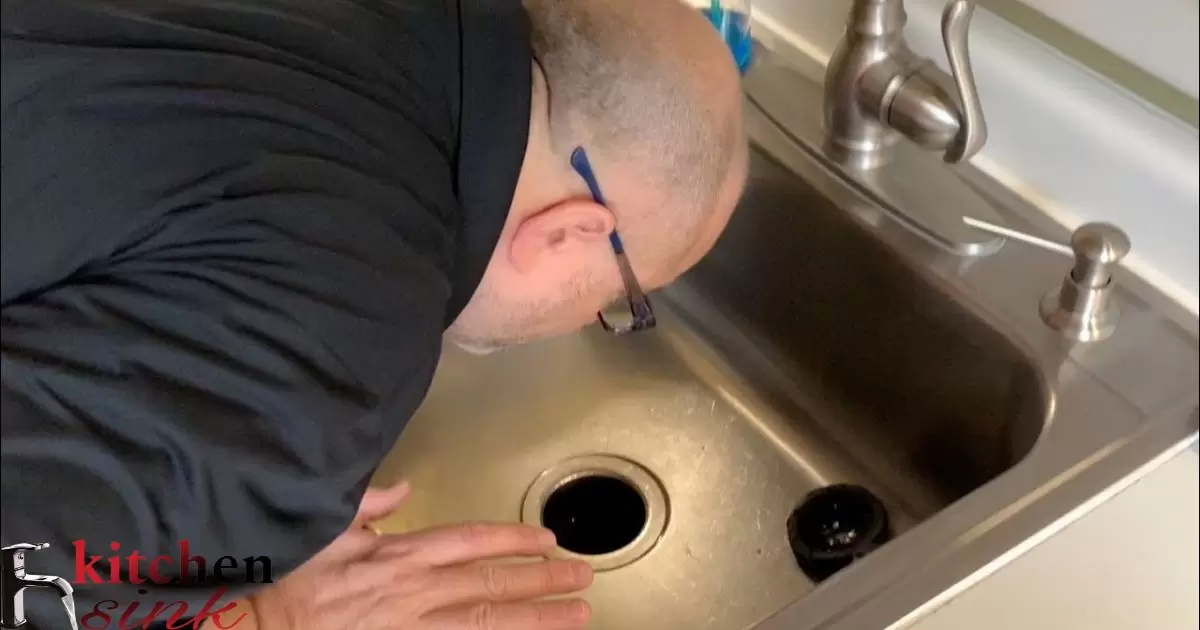Removing smell from the kitchen sink means getting rid of unpleasant odors that tend to accumulate in and around the sink due to food waste, grime, and drain residue. A smelly sink makes cleaning dishes and vegetables an unpleasant task.
Have you noticed an unpleasant smell wafting from your kitchen sink lately? The odor of old food and grease trapped in the drain is enough to turn one’s stomach. But never fear, removing that smell is simple with a few easy tricks.
There are some basic methods that can help remove smells from your kitchen sink with just a few inexpensive items you likely already have at home. Baking soda, lemon juice, vinegar or a commercial cleaner can all help to deodorize your sink and keep it smelling fresh between regular cleanings.
What Causes Kitchen Sink Odors?
Food, water, and grime left behind in the sink overtime can breed bacteria and mold. This leads to unpleasant odors that start to smell throughout the kitchen. Small food particles stuck between the drain and standing water allow odor causing germs to grow quickly. Over time, a thin layer of mold and grime coats the entire sink if not cleaned regularly.
Grease and oils from cut vegetables and meat dropped in the sink also contributes to odors. Without scrubbing after each use, these liquids seep into tiny crevices and cracks in the porcelain or stainless steel. There they mix with other residues and start to decompose giving off smells. Regular wiping and washing helps prevent smears that trap scents.
How Does Food Waste Lead To Smells?
Any food scraps dumped into the drain can rot and smell within a few days. Egg shells, vegetable peelings, coffee grounds and bits of meat or chicken residue abandoned in the strainer cause foul odors. Bacteria feed on these organic matters and their waste is what creates the unpleasant scents. A weekly drain clearing helps remove any clogs where odors may hide.
Even a few bean skins or breadcrumbs neglected in the bottom of the sink can result in a stinky smell within hours on a hot day. It is best to rinse out any food before it has time to rot. Scrape and wash the sink daily, especially around the drain areas to avoid bacterial growth.
Why Does Grease And Grime Cause Unpleasant Odors?
Over time, a thin film of grease builds up on sink surfaces from deposits left behind after washing dishes or produce. This grime acts as a shield trapping in smells from food particles that land on it. Bacteria multiply rapidly in the greasy film nourished by microscopic food bits. The microorganisms are what produce pungent scents as a byproduct of their metabolism.
Oils tend to attract dust and other debris floating in the air. Together, Kitchen Sink To Clog they further encourage odor-causing germs. Regular wiping and washing breaks this cycle so no grime can form a shield. Scrubbing removes any food or grease residue before it contributes to smell-causing bacterial activity.
When Should I Deep Clean My Kitchen Sink?
It is best to deep clean the entire sink area once a month or sooner if odors arise. At minimum, do a thorough scrub every other week. Over time, residues accumulate that are not removed with routine wiping. A deep clean tackles buildup in crevices, underside, and drainage pathways that harbor smells.
Signs that a deep clean is needed include visible grime outlining the sink, staining around the drain, or a strong smelling odor. Before this point, everyday washing should suffice, but leave time for a periodic deeper scrub to sanitize completely.
Effective Ways To Deodorize A Smelly Kitchen Sink
Baking soda is a simple solution and most have it in their pantry already. Sprinkle some on a damp sponge and scrub the sink, including hard to reach areas. Its mild abrasiveness lifts away residues and odors while being gentle on surfaces. Rinsing thoroughly with warm water removes any remaining powders.
Lemons and limes refresh sinks with their zesty scent in place of store-bought sprays. Cut one in half and rub the cut side all over, focusing on mold-prone cracks and crevices. Let sit for 30 minutes before wiping away with a fresh cloth.
How Does Baking Soda Remove Kitchen Sink Smells?
Baking soda has an alkaline quality that counteracts acidic odors left behind by foods and bacteria. When combined with water to form a paste, its granules act like a mild abrasive to scrub away stuck residues. Baking soda also absorbs smells on a molecular level, trapping odors within its porous structure once rinsed away.
Regular sprinklings of baking soda followed by a quick wipe are effective for daily maintenance between deep cleanings. Letting it sit occasionally also allows time for odors to be absorbed before washing the surface prevents their return.
What Is The Baking Soda Sink Cleaning Method?
First, sprinkle baking soda generously all over the sink, including the drain area. Wet a sponge or soft-bristled brush and dip into the powder so it adheres. Scrub the entire sink surface, paying extra attention underneath faucet attachments and crevices. Rinse thoroughly with warm water and wipe dry with a cloth.
For tougher stains, let the baking soda paste sit for 15-30 minutes before scrubbing. Its mild abrasives will have more time to work breaking down residue. Rinse as usual and the sink will be odor-free and clean! Repeat as needed for heavily ingrained smells.
How Long Should I Leave Baking Soda On The Sink?
For routine maintenance, a quick wipe down after sprinkling baking soda is usually sufficient to absorb odors, especially when combined with a bit of water. However, sometimes it is helpful to allow it to sit for a short time to be most effective.
Generally 10-15 minutes of contact time helps the baking soda fully neutralize smells on its own. For heavy grime or baked-on stains, 30 minutes allows its gentle scrubbing granules more soak time before wiping away. Overnight is not necessary, as it usually finishes working within a half hour. Just be sure to rinse all traces away afterward.
Does Baking Soda Really Eliminate Odors?
Yes, baking soda is very effective at removing lingering smells from kitchen sinks and counters thanks to its odor-fighting properties. Combined with light scrubbing, it lifts away residues that harbor germs while absorbing scents on a molecular level through its porous structure.
Done regularly as part of routine cleaning, baking soda keeps sinks fresh and deodorized between deep scrubbings. Even occasional light applications are helpful, such as before having company or making baked goods. Where other air fresheners may just mask scents, baking soda truly removes them at the source. With consistent use, it leaves sinks odor-free.
Using Lemon Juice To Freshen A Stinky Kitchen Sink
Squeeze fresh lemon juice into a smelly sink and scrub with a sponge. Its brightness lifts away odors while leaving behind a fresh citrus scent. Or cut lemons in half and rub cut sides all over the stained surface. Don’t rinse just yet, let the powerful lemon oil work for 30 minutes.
Sometimes it takes a little more than lemon juice alone to banish ground-in odors. Mix juice with baking soda into a paste first before scrubbing to further cut through residues. Rinsing with warm water finally removes the zestiness, along with any trapped smells.
Why Choose Lemon Juice For Sink Deodorizing?
Lemons contain natural compounds that effectively eliminate odors through their zesty lemon oil. Simply wiping with cut halves transfers these deodorizing oils onto sink surfaces where they attack smells. Along with its cleansing acidity, the oil also leaves behind an uplifting citrus fragrance preferred over chemical cleaners.
Lemons are cheaper than dedicated cleaning sprays and most kitchens already have them on hand. They offer a simple household solution for occasional use alongside regular scrubbing and baking soda applications. Plus, they’re environmentally preferable to harsh chemical drain cleaners.
How Can Lemons’ Citrus Scent Remove Smells?
Terpenes are potent odor-fighting essential oils abundantly found in lemon peels. Rubbing cut surfaces onto smelly areas transfers these volatile molecules directly where needed. Terpenes work by disrupting the bond between odorant molecules and receptor proteins in the nose. This stops scents from being interpreted as unpleasant.
Lemons also contain citric and ascorbic acids that break down residues encouraging bacterial odor production. These acids contribute to lemon juice’s ability to cut through soap scum and mineral deposits in sinks that may harbor bacteria. Their cleaning action further helps lift smells from surfaces once scrubbed.
Proper Way To Apply Lemon Juice To My Kitchen Sink
| Method | Steps |
| Cut Lemon Method | 1. Cut lemons in half and wipe cut sides all over sink surface. 2. Pay special attention to drain and crevices. 3. Let sit for 30 minutes before rinsing. |
| Squeeze Method | 1. Squeeze fresh lemon juice directly onto smelly areas of sink. 2. Scrub with a sponge to lift away odors. 3. Rinse thoroughly. |
| Stain Treatment | 1. Rub cut lemons directly onto stained areas before scrubbing. 2. Mix lemon juice with baking soda for boosted cleaning power. |
| Mixture Method | 1. Mix lemon juice with baking soda to form a paste. 2. Scrub paste onto sink with a sponge. 3. Rinse well to remove all oily residue. |
Be sure to always rinse the sink thoroughly after using lemon juice to remove debris and leave it smelling fresh.
Vinegar And Other Acid Cleaners For Deodorizing
White vinegar removes smells just as effectively as lemon juice or baking soda. Fill the sink with hot vinegar and let sit while it works to break down soap scum and kill odor-causing germs. Wipe away with a cloth and rinse thoroughly to avoid any lingering vinegar smells.
Citrus-scented cleaners with vinegar or lemon juice as a main ingredient also help refresh kitchen sinks. Look for products high in acid content versus harsh chemicals that could damage surfaces over many uses. Always spot test prior to full applications.
Does Vinegar Remove Smells From My Kitchen Sink Like Baking Soda?
Yes, distilled white vinegar contains acetic acid powerful enough to eliminate odors through its ability to cut grease and eliminate bacteria growth. Submerge cleaning cloths or sponges in undiluted vinegar and wipe down the entire sink space. Or pour some into the drain itself to disinfect pathways.
Its acidic strength helps break down organic residues that bred microbes causing unpleasant scents. Combined with scrubbing action, it lifts these away from surfaces while neutralizing odors. Vinegar rinses clean easily, leaving behind a fresh, non-toxic scent until next used.
Use White Vinegar To Clean My Smelly Sink
5 easy tips for using white vinegar to clean a smelly sink
- Fill the sink halfway with straight white vinegar and let sit for 15 minutes. This allows vinegar time to absorb odors.
- Scrub with an old toothbrush or scouring sponge to break up residue traps smells.
- For spot treating, dip a cloth in undiluted vinegar and wipe smelly areas.
- Pour vinegar directly into clogged drains and let bubble before flushing clean.
- Rinse well with warm water when done to remove any lingering vinegar scent. Vinegar cuts through grime protecting odors.
Commercial Cleaners For Tough Kitchen Sink Odors
When strong smells persist despite scrubbing, it may be time to try a store-bought cleaner designed specifically for kitchen sink bacteria and soap scum removal. Look for enzymatic formulas containing odor-eating enzymes and degreasers suitable for all surfaces.
Special cleaners are convenient but not necessary for occasional use when switch cleaning methods. Many natural items like baking soda, lemons and vinegar work well regularly at lower costs without harsh ingredients. Commercial cleaners excel at heavily stained sinks requiring deeper deodorizing power.
When Should I Consider Using Store-Bought Cleaners?
Signs it is time to bring out a disinfecting cleaner include constantly returning odors even after scrubbing daily or developing of musty smells overnight. This likely indicates a bacterial or mold issue below the surface requiring stronger bleach-alternative cleaners. They help remove stubborn grime that trapped smells.
Commercial sinks with sealed seams may harbor longer-lasting smells since baking soda cannot penetrate these crevices as well. Regular use can help control hard-to-remove odors from developing due to its degreasing action. Spot test first before full applications.
What Attributes Should I Look For In A Cleaner?
Avoid chemicals and focus on enzymatic options when choosing a store brand. Enzymes specifically target odor-causing biofilms or stains without scratching surfaces like abrasives. Look for pH-balanced formulas safe for all kitchen sink materials including stone, porcelain and stainless steel.
Gentle enough for regular use without damaging over time. Dewaxing or degreasing ingredients help break through heavily stained areas for deeper cleaning. Refreshing scents remove odors instead of just masking them. Leaves sinks sanitized against future smells developing with consistent use.
Do I Need Anything Else To Remove Deep Set Smells?
A scouring sponge or old toothbrush can assist commercial cleaners by helping break apart stuck-on biofilms in crevices where smells lurk. Safety glasses protect eyes from possible splashes. Exhaust fan removes any fumes while products dwell.
Once deodorized, maintain it through regular wiping, scrubbing and occasional baking soda or lemon juice applications. This prevents new residues from building that harbor germs causing future odors. With consistent prevention and remediation as needed, sinks stay fresh-smelling with minimal effort.
Frequently Asked Question
How Can I Prevent Smells From Returning?
By keeping your sink clean and disinfected between uses.
What’s The Best Way To Deodorize The Drain?
Pour baking soda or vinegar down it, let sit, then flush with boiling water.
How Often Should I Deep Clean My Sink?
At least once a month with an all-purpose cleaner or your favorite homemade remedy.
Can Leaving An Open Box Of Baking Soda In The Sink Help?
Yes, the baking soda will absorb odors over time, just don’t forget to replace it monthly.
Should I Use Bleach To Sanitize My Smelly Sink?
Avoid bleaches as they can damage surfaces over time. Natural or enzymatic cleaners are generally safer.
Conclusion
With regular cleaning and deodorizing, keeping smells out of your kitchen sink is simple. Using inexpensive ingredients like baking soda, lemon juice, and vinegar removes odors easily. Checking the sink daily and giving it a good scrub once a week prevents smells from setting in. Don’t forget to stay on top of drain maintenance for long-lasting freshness.
By following these basic techniques, you can always have a clean and fresh-smelling sink area. Whether with all-natural solutions or store-bought cleaners, finding ways to remove smell from the kitchen sink is easy. Maintaining this routine will save you from stenches and keep your kitchen space smelling great. A deodorized sink makes food prep more enjoyable in your home.



